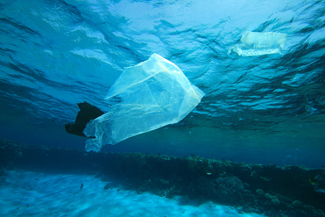A new solution for our plastic waste?
 Polyester polyurethane is unappetizing to most living things – including the sea creatures who encounter it in the Great Pacific Garbage Patch, where recent news shows insects are starting to lay their eggs on pieces of plastic.
Polyester polyurethane is unappetizing to most living things – including the sea creatures who encounter it in the Great Pacific Garbage Patch, where recent news shows insects are starting to lay their eggs on pieces of plastic.What will we do with all the plastic we make – and the oil that we use to make it? Luckily, there are living things that can digest this distasteful meal we are leaving for them. An article from the journal Applied Environmental Microbiology says a range of soil fungi and bacteria can consume polyester polyurethane. Last year, scientists discovered that some of these fungi can consume plastic even when it is buried in landfills.
Fungi also eat other types of petroleum waste, removing cancer-causing compounds and leaving behind a less-toxic residue of minerals. Biodegradable plastics respond especially well to fungi, while oyster mushrooms can break down heavy oil.
These solutions are still being developed and are far from being used on a large scale, so don’t go out and buy a six-pack of bottled water on the assumption that we’ve solved the problem. Oil and plastic still are environmental hazards in many areas far from where these fungi grow.
It will take extensive work to clean up our excess petroleum and plastic. But fungi and bacteria may help us do the job.
You can return to the main Market News page, or press the Back button on your browser.

